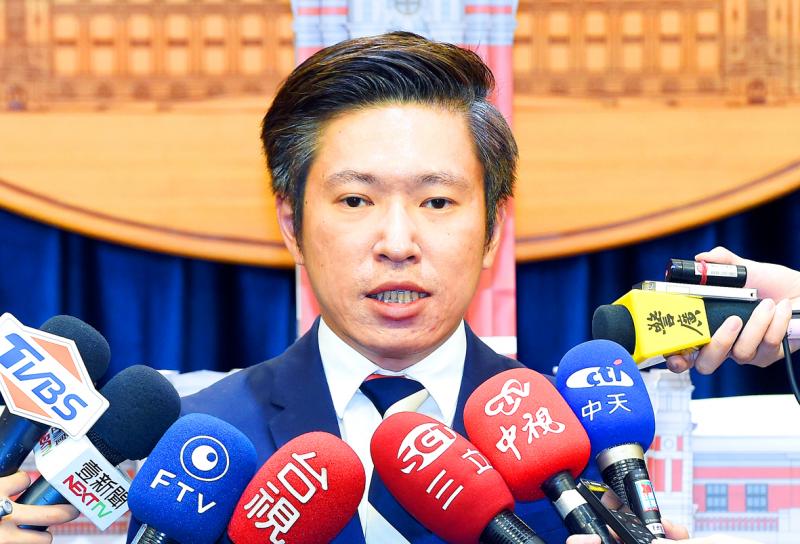The Presidential Office yesterday declined calls from Chinese Nationalist Party (KMT) and Taiwan People’s Party (TPP) politicians for President Tsai Ing-wen (蔡英文) to declare a state of emergency over the COVID-19 situation, saying that any contingencies can be addressed by existing legislation.
KMT Chairman Johnny Chiang (江啟臣) told a KMT Central Standing Committee meeting that the government should consider issuing emergency presidential orders to provide a legal basis for local governments to arrange or call for disease prevention items and also resolve any questions regarding restrictions imposed on the public.
New Taipei City Mayor Hou You-yi (侯友宜) of the KMT said that the government should bar Taiwanese from traveling to countries listed in a Central Epidemic Command Center (CECC) level 3 “warning” travel advisory, bar visitors from those nations from entering Taiwan within 30 days of their nations being listed and halt the importation of foreign workers during the pandemic.

Photo: Liao Chen-huei, Taipei Times
TPP Legislator Jang Chyi-lu (張其祿) said that restrictions under Act 7 of the Special Act on COVID-19 Prevention, Relief and Restoration (嚴重特殊傳染性肺炎防治及紓困振興特別條例) are questionable and could be infringing on constitutionally guaranteed rights.
However, such restrictions are well within the parameters of a state of emergency decree, so instead of applying for a constitutional interpretation or filing for an amendment to clarify whether such restrictions are legal, Tsai should just issue an emergency decree and remove all legal doubts, Jang said.
The Presidential Office said emergency decrees should only be issued in cases of national emergencies or during a financial tumult that would otherwise lack a legal basis.
Under the Constitution, any emergency decree issued by the president must be ratified by the Legislative Yuan, the office said.
The post-SARS amendment to the Communicable Disease Control Act (傳染病防治法) and the special act have provided legal bases for nearly all disease prevention efforts, office spokesperson Xavier Chang (張惇涵) said, adding that an emergency decree was not issued during the SARS outbreak.
Since martial law was lifted in 1987, a state of emergency has only be declared once, after the 921 Earthquake in 1999, Chang said.

The manufacture of the remaining 28 M1A2T Abrams tanks Taiwan purchased from the US has recently been completed, and they are expected to be delivered within the next one to two months, a source said yesterday. The Ministry of National Defense is arranging cargo ships to transport the tanks to Taiwan as soon as possible, said the source, who is familiar with the matter. The estimated arrival time ranges from late this month to early next month, the source said. The 28 Abrams tanks make up the third and final batch of a total of 108 tanks, valued at about NT$40.5 billion

Travel agencies in Taiwan are working to secure alternative flights for travelers bound for New Zealand for the Lunar New Year holiday, as Air New Zealand workers are set to strike next week. The airline said that it has confirmed that the planned industrial action by its international wide-body cabin crew would go ahead on Thursday and Friday next week. While the Auckland-based carrier pledged to take reasonable measures to mitigate the impact of the workers’ strike, an Air New Zealand flight arriving at Taipei from Auckland on Thursday and another flight departing from Taipei for Auckland on Saturday would have to

A group from the Taiwanese Designers in Australia association yesterday represented Taiwan at the Midsumma Pride March in Melbourne. The march, held in the St. Kilda suburb, is the city’s largest LGBTQIA+ parade and the flagship event of the annual Midsumma Festival. It attracted more than 45,000 spectators who supported the 400 groups and 10,000 marchers that participated this year, the association said. Taiwanese Designers said they organized a team to march for Taiwan this year, joining politicians, government agencies, professionals and community organizations in showing support for LGBTQIA+ people and diverse communities. As the first country in Asia to legalize same-sex

MOTIVES QUESTIONED The PLA considers Xi’s policies toward Taiwan to be driven by personal considerations rather than military assessment, the Epoch Times reports Chinese President Xi Jinping’s (習近平) latest purge of the Chinese People’s Liberation Army (PLA) leadership might have been prompted by the military’s opposition to plans of invading Taiwan, the Epoch Times said. The Chinese military opposes waging war against Taiwan by a large consensus, putting it at odds with Xi’s vision, the Falun Gong-affiliated daily said in a report on Thursday, citing anonymous sources with insight into the PLA’s inner workings. The opposition is not the opinion of a few generals, but a widely shared view among the PLA cadre, the Epoch Times cited them as saying. “Chinese forces know full well that